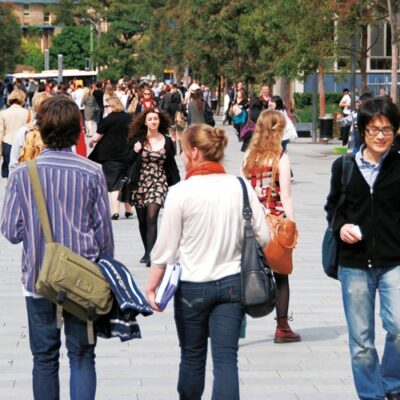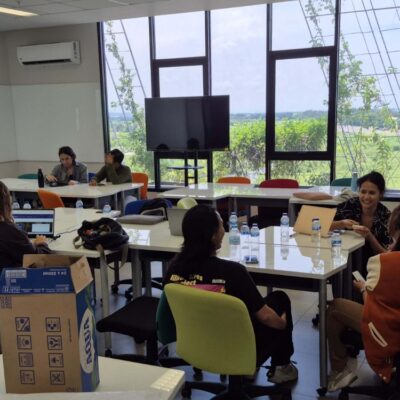The presence of international students from China has been celebrated in Australia as an economic boon, but also—importantly—part of Australia’s soft power; and the Department of Foreign Affairs and Trade has invested heavily in alumni engagement. COVID-19, however, has brought significant shifts in China’s job market, which look set to hinder such ‘influence building’ by Western democracies.
International education as a soft power strategy
Australia has consistently been a top-rated recipient of international students among English-speaking countries and international education was among the top four export industries even during the pandemic which promoted the closure of the national border. In addition to the economic benefits, it has also been seen as an important soft power strategy. For example, Australia’s most recent Foreign Policy White Paper boasts that, among the more than 2.5 million international students who have studied in Australia in the past 50 years, there are ‘[m]any foreign government and business leaders, including heads of state, ministers and CEOs’ who ‘understand our institutions, values and perspective on the world. This is a significant asset for Australia.’
Australia is certainly not alone in monitoring this. The annual Higher Education Policy Institute (HEPI) Soft-Power Index, for example, counts how many serving world leaders were educated in countries other than their own. The top two, the US and the UK, have consistently recorded educating around 60 individuals who later became world leaders, with France next boasting 30-40, and Australia and Russia at a similar level of around ten. Late last year, Universities UK International (UUKi) and HEPI published a report with research from London Economics that demonstrates ‘the net benefit from the intake of international students [in the UK] increased by 27.6% across three years (from 2015-16 to 2018-19)’, including the ‘incontrovertible benefit’ of soft power, ‘which is now more important than ever’.
This ‘soft power building through hosting international students’ is contingent on two assumptions:
- Students do return to their home countries and
- they get to secure jobs in positions of relative importance, preferably in government bodies.
Do Chinese students return?
China’s Ministry of Education had recorded growth in returning international students pre-COVID, with statistics across 2016 and 2019 indicating that 80 percent of students studying abroad returned to China. These include students sent through state-sponsored programs or by their employers, but self-funded/fee-paying students still account for the more than 90 percent of China’s international students.
This growing interest in returning to China to pursue careers has been heightened during the pandemic. In a recent report by China’s largest recruitment platform Zhaopin, there was a 33.9 percent increase in the number of students returning to China in 2020, a level which remained stable throughout 2021.
Intensified competition for returning students
This high number of Chinese students returning to China would seem to bode well for the soft power strategies of host countries. However, students returning to China are experiencing increasing workplace competition vis-a-vis their local counterparts and among themselves.
With more international students returning, the pool of overseas degree holders, or haigui (graduates from overseas universities who return to China), expands too. However, the number of positions available have shrunk significantly during the COVID-19 pandemic, including in cities such as Shenzhen, Shanghai and Beijing which, while among the most economically dynamic, have gone through extended COVID-19 lockdowns, some very recently.
As a result, China’s Ministry of Education (MOE) sounded the alarm in an April 2022 meeting about the employment of university graduates, recognising that ‘it is even more difficult this year than 2020’. Two months away from the graduation month of July, only an average of 23.6 percent of graduates had secured a job (signed an employment contract) by mid-April, while in past years this would normally exceed 70-80 percent at that time.
Zhaopin’s data compilation indicates that positions that are prioritising the recruitment of returned international students have plummeted since 2019, with a year-on-year decrease of 25.4 percent, 23.5 percent and 0.4 percent between 2019 to 2021. With more students returning to fewer available positions, the competition is fierce.
Do international students work in government?
Very few students returning to China are managing to build a career in government, which could be a major blow for ‘soft power’ aspirations. This differs from the situation of students wanting to get a job in Australia with a degree from a UK or North American university, which would possibly be valued or even preferred to an Australian university qualification. Any experience for Australian students in China or other Asian states may be considered an asset for Asia-related positions. But in China an overseas degree is not necessarily preferred to a Chinese one when competing for a government job, which demands more local know-how than a global vision.
Take Shanghai as an example. Publicly available statistics from the Shanghai government indicate that a total of 2,107 public servants were recruited in 2021, of which only 40 graduated from overseas universities (including universities in Hong Kong), representing only 1.9 percent of the total. Australian university graduates accounted for a mere five percent of the returning students entering the public service. Shanghai is one of the top choices for returning international students and it can be safely assumed that such representation would be lower in other municipalities.
International students usually opt for a career in the private sector rather than government. Zhaopin’s statistics show that positions that prioritise returned international students are concentrated in education and training, IT, business services, finance, translation and marketing. The top-ranked sector for these positions is education and training, which accounts for 34.9 percent of the total, has seen a 13.1 percent decrease over the past 12 months.
It’s increasingly difficult for international students to secure a government job
As mentioned earlier, the number of public service positions has been in decline, particularly after COVID-19 hit. In spite of calls to create more positions, the central government has seen its recruitment plan stay about the same: 872 positions for 2019, up to 898 in 2020 and then back to 873 in 2021.
Both the Ministry of Foreign Affairs and the Ministry of Commerce have seen mild growth in the number of available positions. The Ministry of Foreign Affairs, for example, planned to recruit 152 new positions in 2019, down to 142 in 2020 and up to 170 in 2021. The Ministry of Commerce had an even more modest plan, with plans to recruit 37 new positions in 2021. Even these small numbers are an increase from the 30 positions planned in 2019 and only 20 in 2020. It is also important to remember that the real recruitment number can fall short of intended targets.
While the central government has managed to maintain the number of positions available, they account for only a very small fraction of China’s public service jobs. Local (provincial, city or lower) governments, which account for the vast majority of such positions, have mostly seen their plans cut for 2021-2022, in spite of a temporary rise in 2020 in response to unemployment concerns. Henan Province, for example, plans to recruit 7,901 positions during 2021-2022, more than 20 percent less than the previous year. Shanxi, Hubei and Hunan provinces have also announced dramatic cuts to their recruitment plans.
Secondly, while government positions available are shrinking, the number of young people who try to pursue a careers as public servants has been rising dramatically. This is both due to an expanding cohort of university graduates (10.76 million in 2022 according to MOE statistics) and stronger interest in the job security and welfare the public service can offer in the context of an ongoing pandemic. For the 31,242 positions available this year at the central government and various bodies affiliated to it, 2.12 million applications were submitted, again an historical high.
Thirdly and perhaps most importantly, returning students who have been away from China for at least two years do not enjoy any advantage when sitting for the first round of written exams for government positions. These exams are all done in Chinese and heavily emphasise knowledge about China, Chinese political discourse and techniques of writing a memo or briefing paper within Chinese government departments. Building this knowledge and the skills required to fill these positions is not easily acquired at an overseas university. Returning students may likewise find it difficult to adjust to the workplace culture. Graduates from Chinese institutions may spend at least three months taking training courses or preparing for such tests, leaving international graduates at a significant disadvantage when applying for such roles.
A more inward-looking China?
The increasing structural problem in China’s public service, where there are fewer positions available and those available are dominated by domestic students, not only speaks to one of the assumptions made by nations such as Australia in their policy rationale for international education—that of its ‘soft power benefits’—but more importantly points to a future Chinese government with a vision increasingly different from Western democracies like Australia.
While it remains to be debated whether a ‘positive political disposition encourages or results from participation in regional mobility’ for international students, those without such experiences tend to be far less likely to be impressed with ‘the superiority of the democratic, free market system’ and are more likely to view ‘the other’ as threatening.
This generation of home-grown students who are more versed in the domestic Chinese mainstream discourse are now more likely to secure positions in government and more likely to submit to and inherit that discourse. These features of the Chinese government over the past few years in governance and diplomacy are likely to be continued in years to come.
Image: A graduation ceremony in the Australian state of New South Wales – slightly cropped. Credit: Geoff Whalan/Flickr.




